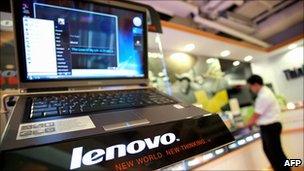Lenovo buys German vendor Medion to boost Europe sales
- Published

Lenovo has been trying to establish itself as a leading player in developed markets such as Europe
Chinese PC maker Lenovo has agreed to buy German electronics retailer Medion in a bid to boost its market share in Europe.
Lenovo will pay $331m (£203m) for a 37% stake in the company.
Lenovo, the world's fourth-largest computer maker said it plans to acquire as much as an 80% stake in the company.
It also said it hoped that the deal would help it double its share of Germany's PC market to 14%.
Medion specialises in sales of low-cost computers and electronic devices.
The announcement pushed Medion shares up by 17% in Frankfurt, but Lenovo's shares fell by more than 3%.
The deal comes just four months after Lenovo signed a deal with Japanese firm NEC to establish a joint venture in Japan.
It is Lenovo's biggest acquisition since it purchased IBM's PC business six years ago.
Better spread
Analysts said the company's business spread was one of the key reasons for the acquisition.
"The situation with Lenovo is that currently almost 50% of its business comes out of China," said Andrew Milroy of Frost & Sullivan.
"The majority of that is also from enterprise customers," he added.
Mr Milroy said that if the company is to take on its rivals and become a dominant global player, its focus has to change.
"They need to establish themselves in the developed markets if they have to take on the likes of Dell and Hewlett Packard," he said.
"Its rivals have a much bigger and better consumer base," Mr Milroy added.
Expansion vs consolidation
The PC market has seen tremendous growth in the past few years, but a squeeze on profit margins and rising prices of raw materials has seen many manufacturers forge alliances and acquire companies in a bid to keep operating margins healthy.
However, analysts said that while Lenovo has been consolidating its business for a while, it has to start looking at expanding its portfolio.
"Lenovo has to start looking at producing the tablet and the next generation devices fast," Mr Milroy said.
He warned that if the company delayed getting into the segment, it may find itself lagging behind rivals.
"No matter what people say, tablets are a serous threat to the traditional PC market," he said.
- Published17 February 2011
- Published27 January 2011